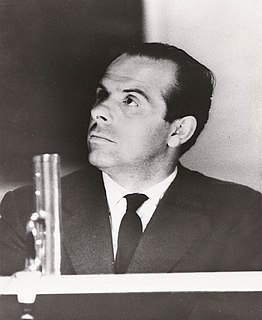
Julia Agrippina, also referred to as Agrippina the Younger, was Roman empress from 49 to 54 AD, the fourth wife and niece of Emperor Claudius.

Nero Claudius Caesar Augustus Germanicus, was the fifth Roman emperor and final emperor of the Julio-Claudian dynasty, reigning from AD 54 until his death in AD 68. He was adopted by the Roman emperor Claudius at the age of 13 and succeeded him on the throne. Nero was popular with the members of his Praetorian Guard and lower-class commoners in Rome and its provinces, but he was deeply resented by the Roman aristocracy. Most contemporary sources describe him as tyrannical, self-indulgent, and debauched. After being declared a public enemy by the Roman Senate, he committed suicide at age 30.

Marcus Otho was the seventh Roman emperor, ruling for three months from 15 January to 16 April 69. He was the second emperor of the Year of the Four Emperors.

Vittorio De Sica was an Italian film director and actor, a leading figure in the neorealist movement.

Alberto Sordi was an Italian actor, voice actor, singer, comedian, director and screenwriter.

Poppaea Sabina, also known as Ollia, was a Roman Empress as the second wife of the Emperor Nero. She had also been wife to the future emperor Otho. The historians of antiquity describe her as a beautiful woman who used intrigues to become empress.
Claudia Acte was a freedwoman of ancient Rome who became a mistress of the emperor Nero. She came from Asia Minor and might have become a slave of the Emperor Claudius, following his expansion of the Roman Empire into Lycia and Pamphylia; or she might have been purchased later, by Octavia, Claudius' daughter.

My Voyage to Italy is a personal documentary by acclaimed Italian-American director Martin Scorsese. The film is a voyage through Italian cinema history, marking influential films for Scorsese and particularly covering the Italian neorealism period.

Claudia Octavia was a Roman empress. She was the daughter of the Emperor Claudius and Valeria Messalina. After her mother's death and father's remarriage to her cousin Agrippina the Younger, she became the stepsister of the future Emperor Nero. She also became his wife, as a marriage between the two was arranged by Agrippina.

Piero Piccioni was an Italian film score composer and lawyer.
Nero is an Italian-British-Spanish television film, part of the Imperium series; it was made film available on DVD as of November 2005 in the U.S. and Canada. Produced by EOS Entertainment and Lux Vide for RAI and Telecinco.

Nero Claudius Caesar Augustus Germanicus and his reign have featured in music, literature, the arts, and in business.

Luigi Comencini was an Italian film director. Together with Dino Risi, Ettore Scola and Mario Monicelli, he was considered among the masters of the commedia all'italiana genre.

Isabelle Corey was a French actress and model.

Giorgia Moll is an Italian film actress. She was sometimes credited as Georgia Moll and Georgia Mool.

Nerone is a 1977 Italian comedy film directed by Castellacci & Pingitore. It parodies real life event of the Roman emperor Nero.

The Moralist is a 1959 Italian comedy film directed by Giorgio Bianchi. Starring Alberto Sordi and Vittorio de Sica, it satirises both the upholders of traditional sexual morality and the exploiters selling sex in a willing market.
Mario Montuori was an Italian film cinematographer and painter.

Nero and the Burning of Rome is a 1953 Italian epic historical drama film directed by Primo Zeglio and loosely based on real life events of Roman emperor Nero. It was based on the novel Nerone e Messalina (c.1949) by Harry Bluhmen.

Satiricosissimo is a 1970 Italian comedy film directed by Mariano Laurenti. It is a parody of the 1969 Federico Fellini film Fellini Satyricon.


















